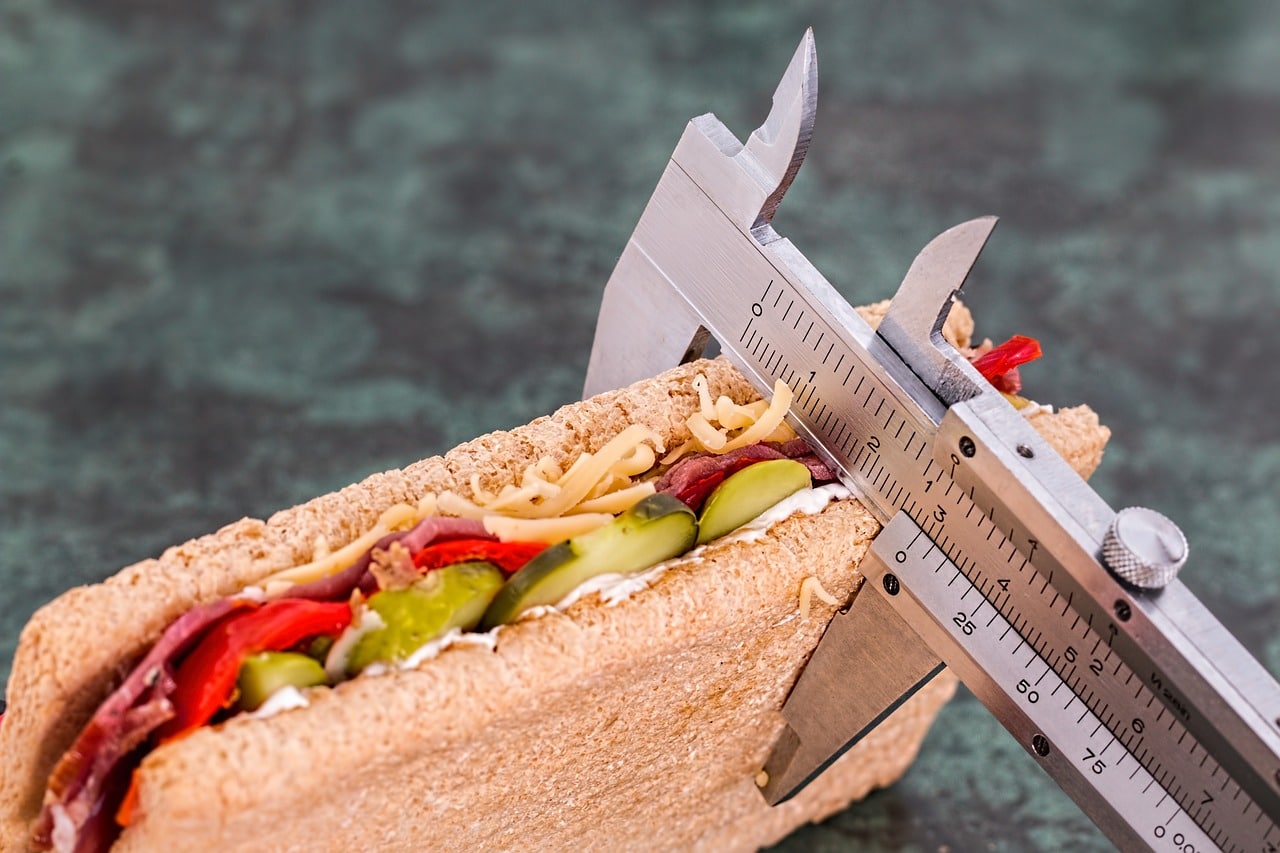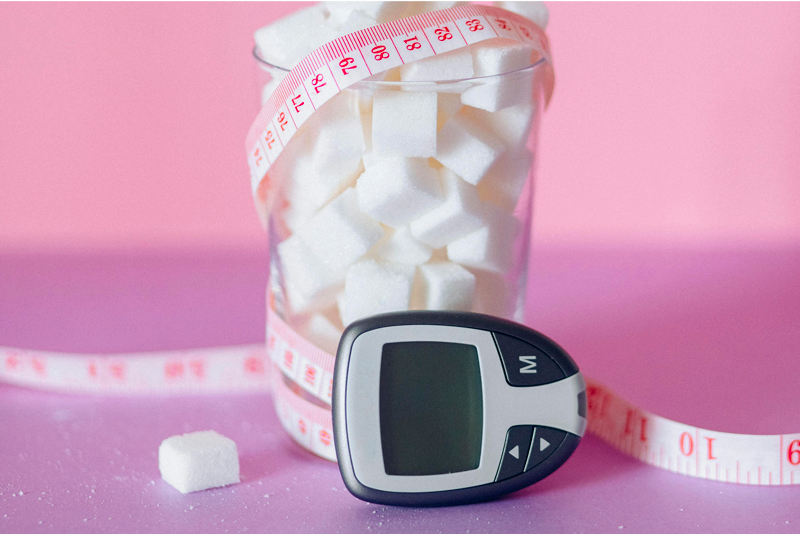
Stable blood sugar levels are key to our general well-being. Fluctuating blood sugar levels can lead to energy highs and lows, uncontrollable cravings and difficulty maintaining a healthy weight. However, whatever your medical situation, you can always take a proactive approach to nutrition to regulate your blood sugar levels.
Eat foods with a low glycaemic index
When you are trying to keep your blood sugar levels stable, you definitely want to prioritise foods with a low glycaemic index. The body assimilates these foods more slowly, resulting in a slower release of glucose into the bloodstream. This avoids sudden spikes in blood sugar, keeping you energised and helping to regulate your appetite.
Non-starchy vegetables are excellent choices for their low glycaemic index. You should consider green vegetables such as spinach, lettuce, kale and broccoli as well. Pulses such as beans, lentils and chickpeas are also rich in fibre and protein, which helps to slow the absorption of carbohydrates.
Wholegrain cereals such as quinoa, oats, barley and brown rice are yet another low glycaemic index options. They are richer in fibre and nutrients than their refined counterparts, making them beneficial for blood sugar stability.
Balance your meals
Choosing the right foods is a good start, but balancing your meals is the next crucial step in regulating blood sugar levels. Try to include a balanced combination of carbohydrates, proteins and healthy fats at each meal. Carbohydrates provide energy, but they can also raise blood sugar levels quickly. To avoid this, favour sources of complex carbohydrates such as the above-mentioned wholegrain cereals, which are rich in fibre and assimilated more slowly by the body. Protein is essential for satiety and can help slow the absorption of carbohydrates. Choose lean protein sources such as eggs, fish, skinless poultry and low-fat dairy products. Healthy fats are also cornerstones of a balanced meal and can help slow the absorption of carbohydrates. Avocados, olive and coconut oils, nuts and seeds are good sources of healthy fats you can definitely include in your diet.
Avoid refined sugars
If you wish to keep your blood sugar levels stable, you will absolutely need to limit your intake of refined sugars. Refined sugars are simple carbohydrates that are quickly digested and cause a rapid rise in blood sugar levels. This can cause spikes in blood sugar (a “sugar high”) followed by a rapid drop (a “sugar crash”), which can contribute to cravings and unwanted energy fluctuations.
Foods containing refined sugars include sugary drinks such as soft drinks, fruit juices, energy drinks and flavoured coffees. Sweets, biscuits, pastries, sweet cereals and desserts are also common sources of refined sugars.
To keep your blood sugar levels stable, you will need to favour healthier, natural alternatives to refined sugars. You can go for natural sweeteners such as stevia, pure maple syrup or raw honey in moderation. But again, bear in mind that even these options should be consumed in moderation.
Increase your fibre intake
Dietary fibre plays an essential role in regulating blood sugar levels. It is indigestible for the body, which means that it is not converted into glucose and has no significant impact on blood sugar levels. Furthermore, fibre-rich foods tend to be digested more slowly, which contributes to a slower release of glucose into the bloodstream.
To regulate your blood sugar, eat more vegetables, fruit, pulses and whole grains, all of which are important sources of fibre.
Non-starchy vegetables, such as spinach, broccoli, peppers and courgettes, are particularly rich in fibre. They can be eaten raw in salads or cooked in tasty dishes to add texture and nutritional value.
Fruit, such as berries, apples, pears and oranges, are also rich in fibre. Prioritise whole fruit rather than fruit juices, as juices tend to be fibre-free and can therefore cause blood sugar levels to rise much faster.
Pulses, such as lentils, black beans and chickpeas, are not only rich in fibre, but also in vegetable protein. They are an excellent source of energy for the day and can be incorporated into a variety of dishes – such as soups, salads or purées.
Wholegrain cereals such as quinoa, oats, barley and brown rice are yet another low glycaemic index option. Replace refined cereals with these healthier alternatives to reap the benefits of fibre while keeping your blood sugar levels more stable.
Choose healthy fats
Be careful not to demonise all fats. In fact, some fats are essential for maintaining stable blood sugar levels and promoting optimal health. Prioritise healthy fats that offer nutritional benefits while helping to slow the absorption of carbohydrates.
Avocados are an excellent source of healthy fats, rich in monounsaturated fatty acids. These fats help maintain satiety, stabilise blood sugar levels and promote slower absorption of carbohydrates by the body. Add sliced avocados to your salads, spread them on wholemeal bread or add them to smoothies to enjoy their benefits.
Nuts and seeds are also excellent sources of healthy fats. Almonds, cashews, hazelnuts, chia seeds, flax seeds and pumpkin seeds are especially rich in unsaturated fatty acids and fibre. They help maintain satiety, stabilise blood sugar levels and reduce sugar cravings. Sprinkle them over your snacks, cereals or salads for an extra dose of nutrients.
Choose unrefined vegetable oils rich in monounsaturated fatty acids, such as olive oil, avocado oil and walnut oil. These oils are excellent for dressings and seasonings, and add delicious flavour to your dishes while helping to regulate blood sugar levels.
Oily fish, such as salmon, mackerel, sardines and trout, are rich in omega-3 fatty acids, which have beneficial effects on heart health and blood sugar regulation. Eating these fish twice a week will help you enjoy their many benefits.
However, keep in mind that healthy fats are more calorie-dense than proteins and carbohydrates, so eat them in moderation to maintain an appropriate calorie balance.
Control your portions
Portion size plays a crucial role in regulating blood sugar levels. Even when talking about healthy food, too much of a good thing can lead to a rise in blood sugar levels. So remember to control portion sizes to maintain a proper balance.
When preparing your meals, use appropriately sized plates and visualise the recommended portions for each food group. For example, a portion of carbohydrates, such as cereals or pasta, is generally equivalent to half a cup, or a portion the size of a fist.
A simple tip for portion control is to fill half your plate with non-starchy vegetables, a quarter with lean protein and the other quarter with complex carbohydrates. This ensures nutritional balance and limits the amount of carbohydrates consumed at each meal.
Learn to listen to your body’s satiety signals. Eat slowly and stop when you feel satisfied, but not excessively full. It takes about 20 minutes for the brain to receive satiety signals, so eating slowly helps regulate your food intake.
For snacks, prepare individual portions or use appropriately sized containers to avoid overeating. This will help you avoid fluctuations in blood sugar levels caused by over-consumption of carbohydrates or calories.
Watch out for snacks
Snacks can play an important role in regulating blood sugar levels, especially when you feel a little hungry between meals. It is therefore essential to choose healthy snacks that help keep blood sugar levels stable, rather than falling for foods high in sugar or fat.
When choosing snacks, opt for balanced options that combine protein, complex carbohydrates and healthy fats. This slows the absorption of carbohydrates, provides lasting energy and keeps blood sugar levels stable.
A handful of nuts, such as almonds, cashews or hazelnuts, makes for an excellent snack, rich in healthy fats and protein. Nuts also provide a good amount of fibre, which helps to stabilise blood sugar levels.
Raw vegetables, such as carrot, celery or cucumber sticks, accompanied by a bean or Greek yoghurt dip, make a nutritious and satiating snack. Vegetables are low in calories and high in fibre, which helps to keep blood sugar levels stable while providing essential nutrients.
Plain Greek yoghurt with fresh berries or chia seeds is yet another healthy and balanced snack option. Greek yoghurt is rich in protein and healthy fats, while the berries provide fibre and beneficial antioxidants.
But again, you should definitely control your portions, even when it comes to healthy snacks. Avoid snacking straight from the packet, as this can lead to you eating more than you need. Prepare individual portions or use containers to keep portions under control.
Hydrate well
Adequate hydration plays a crucial role in regulating blood sugar levels. When you are dehydrated, your body can have trouble keeping blood sugar levels stable. So remember to drink enough water throughout the day.
Water helps dilute glucose in the blood, making it easier to transport to the cells. Furthermore, adequate hydration promotes better blood circulation, which allows glucose to be absorbed and used more efficiently.
Make sure you drink water regularly throughout the day, even if you are not necessarily thirsty. A good guideline is to aim for around 8 glasses of water a day, but individual needs may vary depending on physical activity, environment and other factors.
If you find it difficult to drink enough water, try adding slices of lemon, cucumber or mint to flavour your water. Unsweetened herbal teas are also a good option for staying hydrated.
Avoid sugary drinks such as soft drinks, fruit juices and energy drinks, as they can cause rapid blood sugar spikes due to their high sugar content. Instead, opt for water, unsweetened tea, black coffee or herbal infusions with no added sugar.
Bear in mind that hydration isn’t just about water. Certain water-rich food – such as cucumbers, watermelons and citrus fruits – can also contribute to your daily water intake.
Avoid processed foods
When trying to keep your blood sugar levels stable, you should always limit your intake of processed foods. Processed foods are often high in added sugars, saturated fats and artificial ingredients, which can lead to rapid blood sugar spikes and imbalances in your blood sugar levels.
Processed foods include pre-packaged foods such as crisps, biscuits, chocolate bars, pastries, sugary cereals and ready meals. These foods are often high in empty calories and low in essential nutrients.
Instead, opt for fresh, unprocessed foods. Prioritise fresh fruit and vegetables, lean meats, fish, eggs, pulses, whole grains and low-fat dairy products.
Cook your meals from scratch as much as possible, using fresh, natural ingredients. This gives you total control over the ingredients you eat and helps you avoid additives and excess sugar. When you go shopping, read the nutrition labels carefully. Avoid foods containing added sugars, syrups, saturated fats, trans-fatty acids and artificial additives.
Exercise regularly
Regular physical activity plays an essential role in regulating blood sugar levels. When you engage in physical activity, your body uses glucose as an energy source, which helps maintain balanced blood glucose levels.
Regular exercise helps improve sensitivity to insulin, the hormone that helps regulate blood sugar levels. When you are physically active, your body becomes more efficient at using insulin, which facilitates the absorption of glucose by the cells and reduces the load on the pancreas.
Health guidelines usually recommend at least 150 minutes of moderate-intensity activity every week, spread over several days. This could include activities such as brisk walking, running, swimming, cycling, dancing or any other aerobic activity that raises your heart rate.
In conclusion, keeping blood sugar levels stable is beneficial for everyone, regardless of their medical condition. The nutritional advice presented here offers simple, accessible strategies for regulating your blood sugar levels and promoting optimal health.
Our latest publications
Want to learn more about topics related to blood sugar management?
Here are our most recent blog posts!



